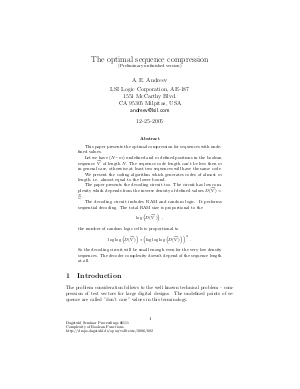The optimal sequence compression
Author Alexander E. Andreev
-
Part of:
Volume:
Dagstuhl Seminar Proceedings, Volume 6111
Part of: Series: Dagstuhl Seminar Proceedings (DagSemProc) - License:
 Creative Commons Attribution 4.0 International license
Creative Commons Attribution 4.0 International license
- Publication Date: 2006-10-09
File

PDF
DagSemProc.06111.19.pdf
- Filesize: 139 kB
- 11 pages
Document Identifiers
Subject Classification
Keywords
- Compression
- partial boolean function
Metrics
- Access Statistics
-
Total Accesses (updated on a weekly basis)
0Document
0Metadata
Abstract
This paper presents the optimal compression for sequences with
undefined values.
Let we have $(N-m)$ undefined and $m$ defined positions in the
boolean sequence $vv V$ of length $N$. The sequence code length
can't be less then $m$ in general case, otherwise at least two
sequences will have the same code.
We present the coding algorithm which generates codes of almost $m$
length, i.e. almost equal to the lower bound.
The paper presents the decoding circuit too. The circuit has low
complexity which depends from the inverse density of defined values
$D(vv V) = frac{N}{m}$.
The decoding circuit includes RAM and random logic. It performs
sequential decoding. The total RAM size is proportional to the
$$logleft(D(vv V)
ight) ,$$
the number of random logic cells is proportional to
$$log logleft(D(vv V)
ight) * left(log log logleft(D(vv V)
ight)
ight)^2 .$$
So the decoding circuit will be small enough even for the very low
density sequences. The decoder complexity doesn't depend of the
sequence length at all.
Cite As Get BibTex
Alexander E. Andreev. The optimal sequence compression. In Complexity of Boolean Functions. Dagstuhl Seminar Proceedings, Volume 6111, pp. 1-11, Schloss Dagstuhl – Leibniz-Zentrum für Informatik (2006)
https://doi.org/10.4230/DagSemProc.06111.19
BibTex
@InProceedings{andreev:DagSemProc.06111.19,
author = {Andreev, Alexander E.},
title = {{The optimal sequence compression}},
booktitle = {Complexity of Boolean Functions},
pages = {1--11},
series = {Dagstuhl Seminar Proceedings (DagSemProc)},
ISSN = {1862-4405},
year = {2006},
volume = {6111},
editor = {Matthias Krause and Pavel Pudl\'{a}k and R\"{u}diger Reischuk and Dieter van Melkebeek},
publisher = {Schloss Dagstuhl -- Leibniz-Zentrum f{\"u}r Informatik},
address = {Dagstuhl, Germany},
URL = {https://drops.dagstuhl.de/entities/document/10.4230/DagSemProc.06111.19},
URN = {urn:nbn:de:0030-drops-6025},
doi = {10.4230/DagSemProc.06111.19},
annote = {Keywords: Compression, partial boolean function}
}
